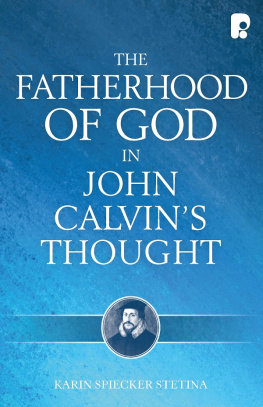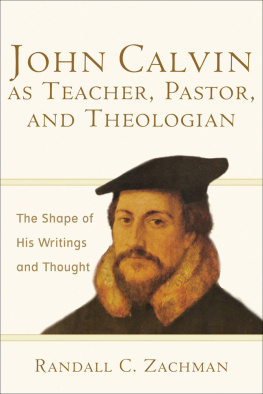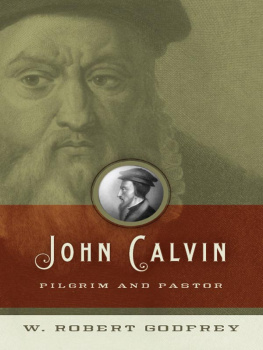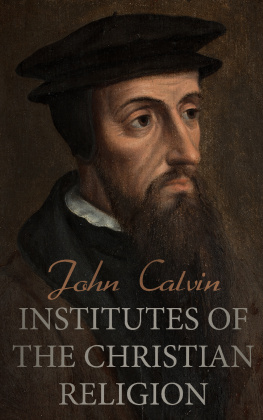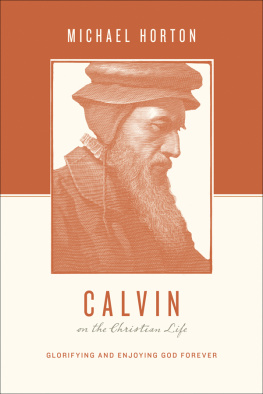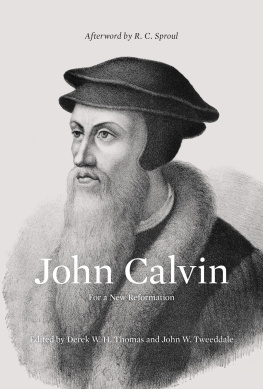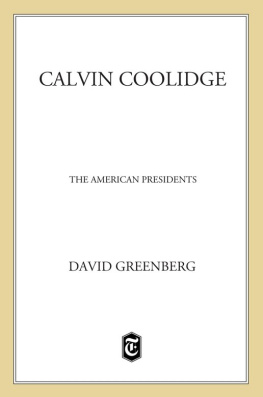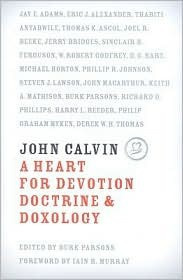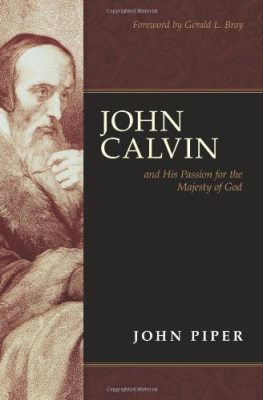Calvin Jean - The fatherhood of God in John Calvin’s thought
Here you can read online Calvin Jean - The fatherhood of God in John Calvin’s thought full text of the book (entire story) in english for free. Download pdf and epub, get meaning, cover and reviews about this ebook. year: 2016, publisher: Paternoster, genre: Religion. Description of the work, (preface) as well as reviews are available. Best literature library LitArk.com created for fans of good reading and offers a wide selection of genres:
Romance novel
Science fiction
Adventure
Detective
Science
History
Home and family
Prose
Art
Politics
Computer
Non-fiction
Religion
Business
Children
Humor
Choose a favorite category and find really read worthwhile books. Enjoy immersion in the world of imagination, feel the emotions of the characters or learn something new for yourself, make an fascinating discovery.
- Book:The fatherhood of God in John Calvin’s thought
- Author:
- Publisher:Paternoster
- Genre:
- Year:2016
- Rating:5 / 5
- Favourites:Add to favourites
- Your mark:
- 100
- 1
- 2
- 3
- 4
- 5
The fatherhood of God in John Calvin’s thought: summary, description and annotation
We offer to read an annotation, description, summary or preface (depends on what the author of the book "The fatherhood of God in John Calvin’s thought" wrote himself). If you haven't found the necessary information about the book — write in the comments, we will try to find it.
Calvin Jean: author's other books
Who wrote The fatherhood of God in John Calvin’s thought? Find out the surname, the name of the author of the book and a list of all author's works by series.
The fatherhood of God in John Calvin’s thought — read online for free the complete book (whole text) full work
Below is the text of the book, divided by pages. System saving the place of the last page read, allows you to conveniently read the book "The fatherhood of God in John Calvin’s thought" online for free, without having to search again every time where you left off. Put a bookmark, and you can go to the page where you finished reading at any time.
Font size:
Interval:
Bookmark:

THE
FATHERHOOD
OF GOD
IN
JOHN
CALVINS
THOUGHT
THE
FATHERHOOD
OF GOD
IN
JOHN
CALVINS
THOUGHT
Karin Spiecker Stetina

Copyright 2016 Karin Spiecker Stetina
22 21 20 19 18 17 16 7 6 5 4 3 2 1
First published 2016 by Paternoster
Paternoster is an imprint of Authentic Media Limited
PO Box 6326, Bletchley, Milton Keynes, MK1 9GG.
authenticmedia.co.uk
The right of Karin Spiecker Stetina to be identified as the Author of this Work has been asserted by her in accordance with the Copyright, Designs and Patents Act 1988.
All rights reserved. No part of this publication may be reproduced, stored in a retrieval system, or transmitted in any form or by any means, electronic, mechanical, photocopying, recording or otherwise, without the prior permission of the publisher or a licence permitting restricted copying. In the UK such licences are issued by the Copyright Licensing Agency, Saffron House, 610 Kirby Street, London, EC1N 8TS.
British Library Cataloguing in Publication Data
A catalogue record for this book is available from the British Library
ISBN 978-1-84227-968-7
978-1-78078-269-0 (e-book)
Scripture quotations marked (ESV) are from The Holy Bible, English Standard Version (ESV), copyright 2001 by Crossway, a publishing ministry of Good News Publishers. Used by permission. All rights reserved.
Scripture quotations marked (NLT) are taken from the Holy Bible, New Living Translation, copyright 1996, 2004. Used by permission of Tyndale House Publishers, Inc., Wheaton, Illinois 60189. All rights reserved.
Cover Design by David Smart
Printed and bound by CPI Group (UK) Ltd., Croydon, CR0 4Y
Dedicated to Mark Noll and the late Tim Phillips, my professors who inspired me through their excellent scholarship and deep faith in Christ.
Contents
Portions of the work have been delivered as lectures at the Evangelical Theological Society meetings in 2010, 2011, and 2013.
I also want to thank Paternoster for permission to reprint parts of my chapters: "Abba Father": Calvins Biblical Understanding of the Fatherhood of God in Since We Are Justified by Faith: Justification in the Theologies of the Reformation (ed. Michael Parsons; Milton Keynes, UK: Paternoster, 2012); and John Calvin on Revelation and the Use of Feminine Imagery for God in Aspects of Reformation. Reforming Theology and Practice (ed. Michael Parsons; Milton Keynes, UK: Paternoster, 2013).
And because we are his children, God has sent the Spirit of his Son into our hearts, promoting us to call out, Abba, Father.
I believe in God, the Father Almighty, the Maker of heaven and earth, and in Jesus Christ, his only Son, our Lord; who was conceived by the Holy Spirit. This ancient declaration about God has been an essential affirmation of the Christian faith since the birth of the early church. The Apostles Creed affirms Pauls teaching in 2 Corinthians 5:21 in which he states, For he [God the Father] made him [Christ] to be sin who knew no sin [for us], so that in him [Christ] we might become the righteousness of God. Faith in God the Father, Son, and Holy Spirit unites us to Christs salvific work. But what if your earthly experience of fatherhood has made it difficult for you to confess a belief in God, the Father Almighty? How does ones understanding of fatherhood impact ones faith?
Margot Starbuck recounts her struggle with the fatherhood of God in her spiritual memoir, The Girl in the Orange Dress: Searching for a Father Who Does Not Fail. She writes:
Are you like the string of human fathers Ive experienced, or are you something else? ... Are you like the first father who couldnt be bothered to lay eyes on me? Are you like the daddy I loved who left me? Are you like the ill-equipped stepfather who left me? Maybe youre like that first father who, decades later didnt even want the second chance hed been given.
Margots disappointing experience of earthly fatherhood is not uncommon. Even for those who have not been adopted, have not been subjected to the devastating effects of divorce, or have not had an alcoholic father, like Margot, it is not difficult to relate to her disappointment. Frequently our earthly experiences serve as the lens by which we perceive our heavenly Father, clouding our understanding of the fatherhood of God.
Margot Starbuck, like many Christians, desired to discover in God a Father that transcends our human paternal experiences. The reformer, John Calvin, found such a Father in Gods self-revelation given in the Holy Scriptures. While some scholars suggest that the Reformation produced a more oppressive patriarchal understanding of God, Calvins biblical portrayal of God accentuates the faithful, tender-loving care of the heavenly Father. In a culture that struggles with the concept of fatherhood, especially as a title for God, Calvins biblically grounded approach to knowing God as Father stands as an appropriate model for the church today.
Suppose the reformer stops saying that a good woman may be like God and begins saying that God is like a good woman. Suppose he says that we might just as well pray to Our Mother which art in heaven as to Our Father. Suppose he suggests that the Incarnation might just as well have taken a female as a male form, and the Second person of the Trinity be as well called the Daughter as the Son ... Now it is surely the case that if all these supposals were ever carried into effect we should be embarked on a different religion. Goddesses have, of course, been worshipped: many religions have had priestesses. But they are religions quite different in character from Christianity.
C.S. Lewis wrote these words in 1948 in response to the question of whether or not priestesses should be allowed in the church; however, his ideas could very well address the current controversy over God-language. Elizabeth Achtemeier poses the question succinctly in the title of her article, Female Language for God: Should the Church Adopt It?
Lewis words above echo the thoughts of many scholars who have responded in the negative to Achtemeiers question. Lewis believed that God-language is to be grounded in Gods self-revelation in Scripture and is therefore immutable; if we depart from the masculine imagery given in the Scripture, we depart from true Christianity. He writes,
Christians think that God Himself has taught us how to speak of Him. To say that it does not matter is to say either that all the masculine imagery is not inspired, is merely human in origin, or else that, though inspired, it is quite arbitrary and unessential. And this is surely intolerable: or, if tolerable, it is an argument not in favour of Christian priestesses but against Christianity.
While it is unclear whether Lewis would have opposed the use of any female biblical imagery in the church, it is evident that he saw a danger in replacing all masculine language of the Bible with feminine language.
Many feminists and contemporary scholars who advocate for the use of female language for God have claimed that Christianity is a sexist religion with a male God and traditions of male leadership that sanction the supremacy of men in the family and society.
In a similar vein, Rita Gross claims male God-language perpetuates sexist traditions. She believes that God-language is merely a reflection of human ideology arguing that God language does not really tell us about God, but it does tell us a considerable amount about those who use the God language. The metaphors and analogies that we use for God have a foundation in our human experience.
Font size:
Interval:
Bookmark:
Similar books «The fatherhood of God in John Calvin’s thought»
Look at similar books to The fatherhood of God in John Calvin’s thought. We have selected literature similar in name and meaning in the hope of providing readers with more options to find new, interesting, not yet read works.
Discussion, reviews of the book The fatherhood of God in John Calvin’s thought and just readers' own opinions. Leave your comments, write what you think about the work, its meaning or the main characters. Specify what exactly you liked and what you didn't like, and why you think so.

